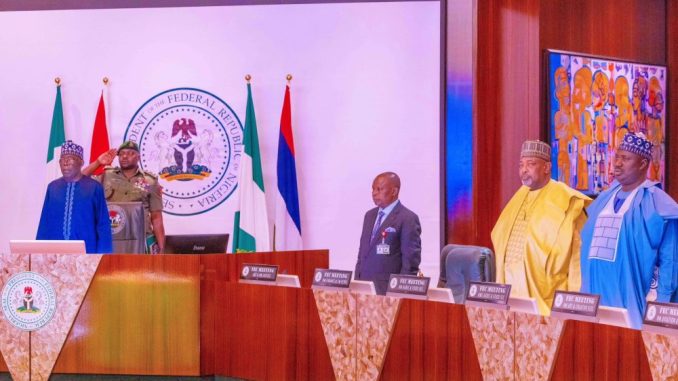
The Federal Executive Council (FEC) has approved Nigeria’s full membership of the Asian Infrastructure Investment Bank (AIIB) as a non-regional member.
Naija News understands that this marks a significant milestone in the country’s international economic engagement, aimed at bolstering infrastructure development and promoting long-term economic growth.
Minister of Finance and Coordinating Minister of the Economy, Wale Edun, disclosed the decision during a briefing with journalists at the State House, Abuja, following the FEC meeting presided over by President Bola Ahmed Tinubu.
Edun explained that the decision to formalize Nigeria’s membership in the AIIB would aid in infrastructure development and help promote sustained economic growth.
“I had the honour to present to the Federal Executive Council today a memo seeking the approval of the membership of Nigeria to the Asian Infrastructure Investment Bank, as a non-regional member,” Edun said.
The AIIB, although headquartered in Asia and primarily composed of Asian countries, also accepts non-regional members. Nigeria was invited to join the bank in 2021, and after completing the necessary legal, administrative, and financial processes, the country is now a fully-fledged member.
Edun further highlighted Nigeria’s subscription, which includes 50 shares at a value of $100,000 per share, totaling $5 million.
This subscription is expected to enhance Nigeria’s participation in AIIB’s initiatives for infrastructure projects and economic development.
During the recent World Bank/IMF Spring Meetings in Washington DC, Edun noted that Nigeria’s macroeconomic reform efforts under President Tinubu had been affirmed by international partners.
He pointed to the IMF’s Article IV Consultation as evidence of growing confidence in Nigeria’s economy. “It is the resilience that has been created by the macroeconomic reforms that stabilised the economy that have allowed us to cope with the recent introduction of reciprocal tariffs in America and the turbulence that has caused,” Edun remarked.
Additionally, global ratings agency Fitch upgraded Nigeria’s credit outlook from B- to B with a positive outlook, validating the administration’s reform agenda.
Edun emphasized that President Tinubu is committed to continuing these economic reforms, focusing on “rapid, sustained, inclusive growth” to lift millions of Nigerians out of poverty.
In a separate development, the FEC approved the transmission of a draft bill to the National Assembly aimed at establishing the National Cocoa Management Board. The bill, which will be forwarded through the Ministry of Justice, is intended to revitalize Nigeria’s cocoa sector.
Minister of Agriculture and Food Security, Abubakar Kyari, highlighted the importance of cocoa as Nigeria’s leading non-oil foreign exchange earner and a vital contributor to the country’s GDP.
“Cocoa is the highest non-oil revenue contributor to the Nigerian GDP. However, we are still lagging behind in terms of our competitors next door — that is between Cote d’Ivoire and Ghana,” Kyari said.
Kyari noted that both Cote d’Ivoire and Ghana have established national boards to manage their cocoa industries and that Nigeria had initiated discussions with these countries to explore collaborative frameworks.
“Part of the resolution that was reached was to copy what they had done in Cote d’Ivoire and also in Ghana, where they have established the National Cocoa Management Board,” he said.
Before the approval, the Ministry had set up a Cocoa Management Committee to assess the feasibility of establishing the new board. The committee’s findings formed the basis for the bill now set for transmission.
The proposed board will include representatives from both the public and private sectors, including state governments and research institutions. Kyari further explained that representatives of sub-nationals, such as deputy governors and cocoa research institutes would be involved in the board’s activities.

